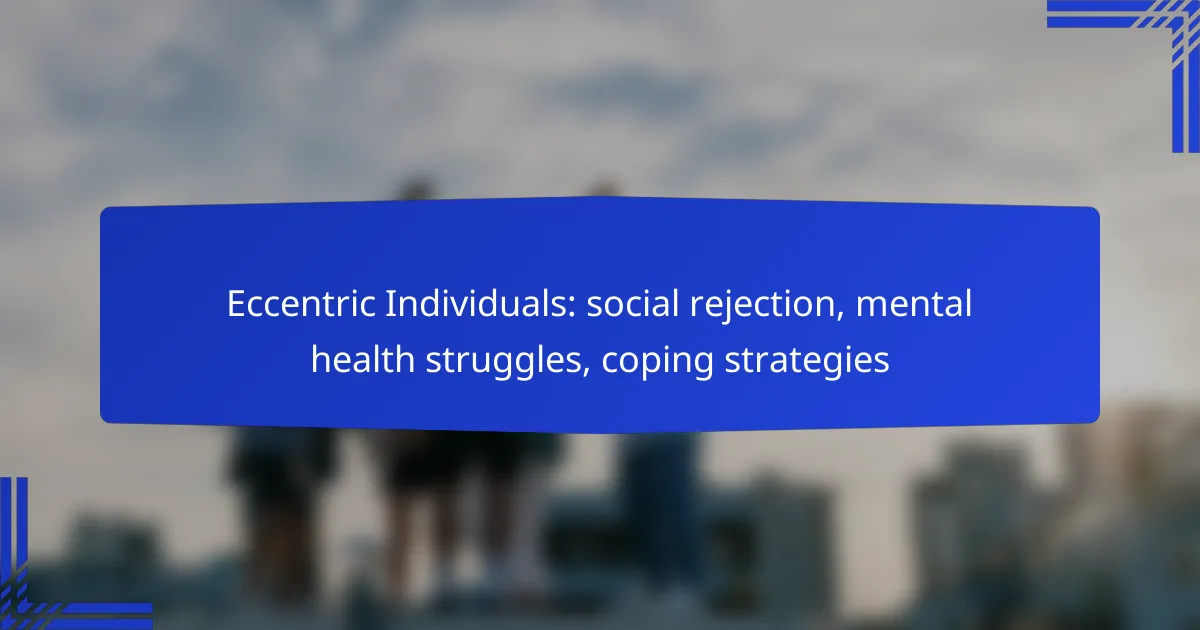Eccentric individuals often face social rejection, which can lead to significant mental health struggles, including feelings of loneliness and inadequacy. Understanding the unique challenges they encounter is essential for fostering empathy and support. Coping strategies such as mindfulness practices, support groups, and creative outlets can play a vital role in enhancing their mental well-being and helping them navigate their experiences.
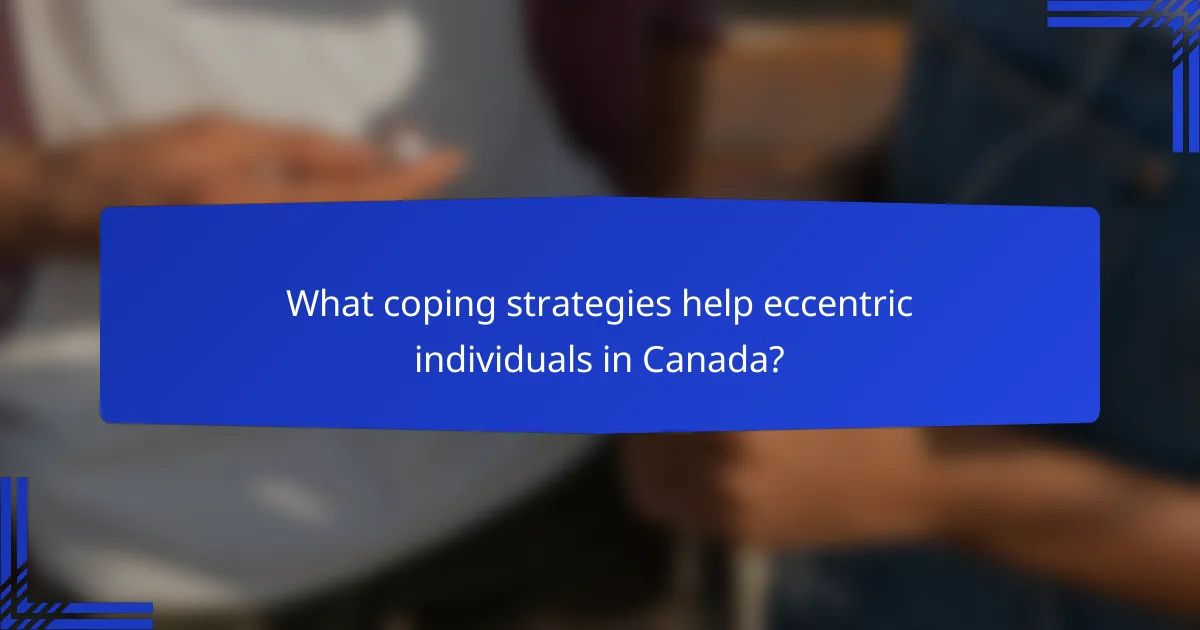
What coping strategies help eccentric individuals in Canada?
Coping strategies for eccentric individuals in Canada often focus on enhancing mental well-being and fostering social connections. These strategies can include mindfulness practices, support groups, and creative outlets, each offering unique benefits to help manage social rejection and mental health challenges.
Mindfulness practices
Mindfulness practices can significantly aid eccentric individuals by promoting self-awareness and emotional regulation. Techniques such as meditation, deep breathing, and yoga help reduce anxiety and improve focus, making it easier to cope with social rejection.
In Canada, many community centers and wellness studios offer mindfulness classes tailored to different skill levels. Engaging in these practices regularly can lead to improved mental clarity and a greater sense of peace.
Support groups
Support groups provide a safe space for eccentric individuals to share their experiences and feelings with others who understand their struggles. These groups can foster a sense of belonging and reduce feelings of isolation, which are common among those facing social rejection.
In Canada, organizations like the Canadian Mental Health Association offer various support groups focused on different aspects of mental health. Joining a group can be a valuable step towards building a supportive community and developing coping strategies together.
Creative outlets
Engaging in creative outlets allows eccentric individuals to express themselves and channel their emotions constructively. Activities such as painting, writing, or music can serve as therapeutic tools to process feelings and reduce stress.
Many community centers across Canada host workshops and classes that encourage creative expression. Finding a local group or class can enhance social interaction while providing a productive way to cope with life’s challenges.
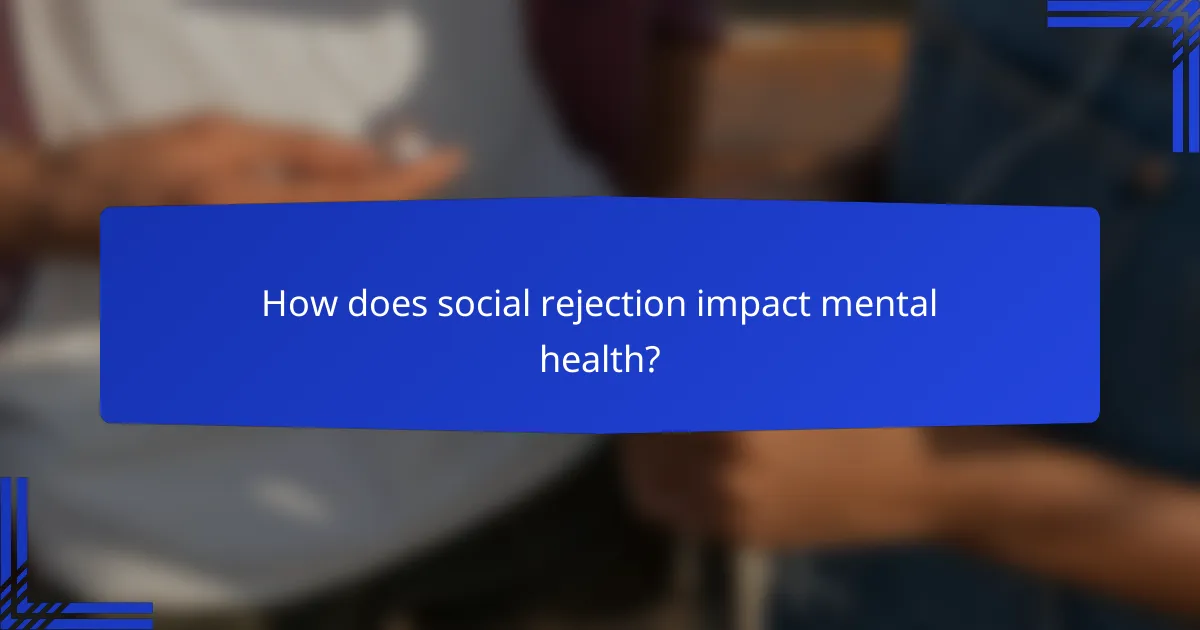
How does social rejection impact mental health?
Social rejection can significantly affect mental health by increasing feelings of loneliness and inadequacy. Individuals who experience rejection may struggle with their self-esteem and develop various mental health issues, making it crucial to understand these impacts.
Increased anxiety
Social rejection often leads to heightened anxiety, as individuals may become overly concerned about how others perceive them. This anxiety can manifest in social situations, making it difficult to engage with others or form new relationships.
People may experience symptoms such as racing thoughts, sweating, or a rapid heartbeat when faced with social interactions. To cope, it can be helpful to practice relaxation techniques, such as deep breathing or mindfulness, to manage anxiety levels.
Depression risk
Experiencing social rejection can elevate the risk of developing depression. Feelings of worthlessness and hopelessness may arise, especially if the rejection is perceived as a reflection of one’s value.
To mitigate this risk, individuals should seek support from friends, family, or mental health professionals. Engaging in activities that foster a sense of belonging, such as joining clubs or volunteer groups, can also help counteract depressive feelings.
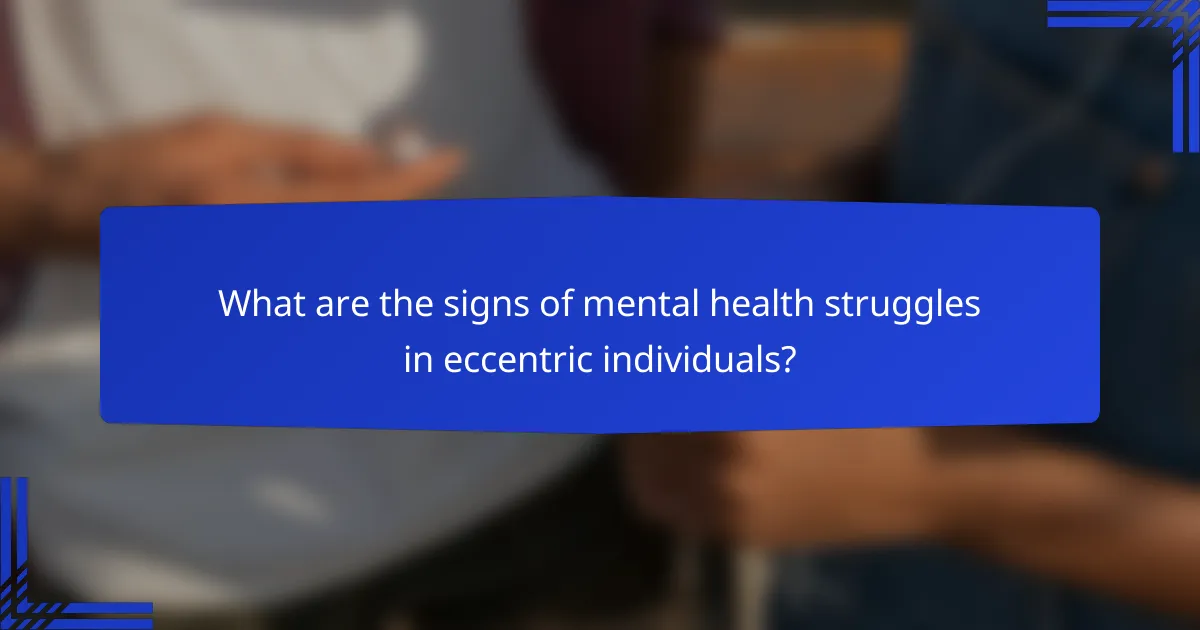
What are the signs of mental health struggles in eccentric individuals?
Eccentric individuals may exhibit various signs of mental health struggles, including social withdrawal and unusual behavior patterns. Recognizing these signs can help in understanding their mental well-being and providing appropriate support.
Social withdrawal
Social withdrawal is a common sign of mental health issues among eccentric individuals. They may isolate themselves from friends and family, avoiding social interactions that once brought them joy. This withdrawal can lead to increased feelings of loneliness and exacerbate their mental health challenges.
It’s important to observe changes in social habits. For example, if an individual who previously enjoyed gatherings suddenly stops attending, it may indicate underlying struggles. Encouraging gentle re-engagement in social activities can be beneficial, but it should be approached with sensitivity to avoid overwhelming them.
Unusual behavior patterns
Unusual behavior patterns can manifest in various ways, such as engaging in unconventional hobbies or expressing thoughts that diverge significantly from societal norms. These behaviors may be a coping mechanism for underlying mental health issues, reflecting their unique perspectives on life.
Examples of unusual behavior might include extreme routines, eccentric fashion choices, or unconventional communication styles. While these traits can be part of their identity, it’s crucial to differentiate between harmless eccentricity and behaviors that may signal distress. Observing the context and frequency of these behaviors can provide insights into their mental health status.
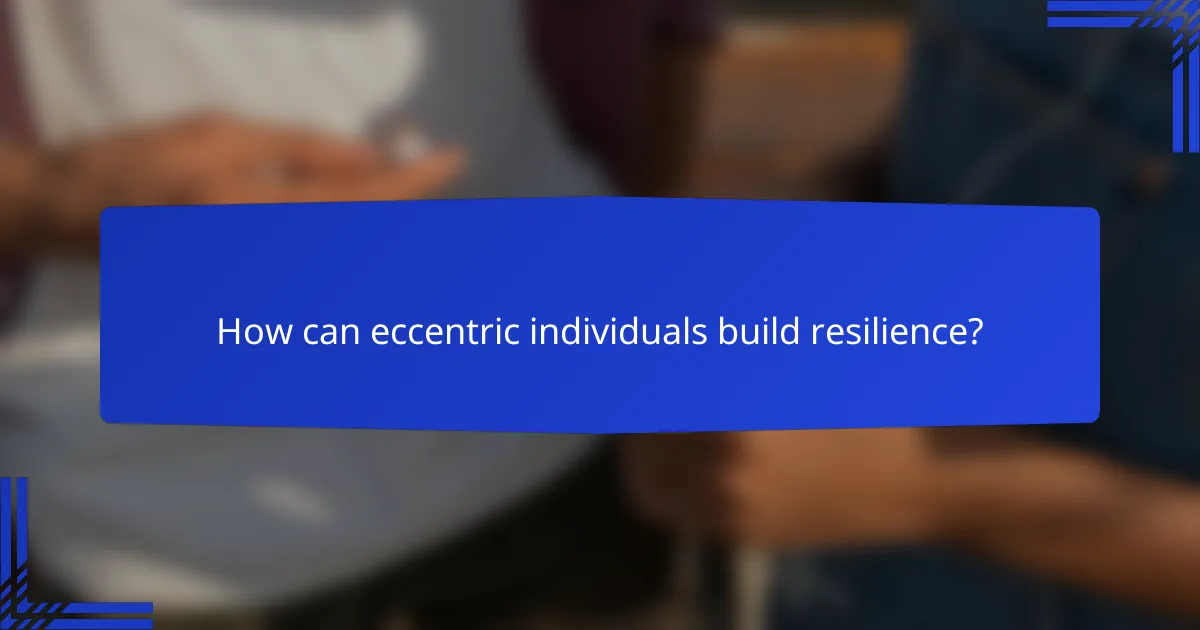
How can eccentric individuals build resilience?
Eccentric individuals can build resilience by embracing their uniqueness and actively seeking supportive environments. This involves developing self-acceptance and creating a network of understanding relationships that can help navigate social challenges.
Developing self-acceptance
Self-acceptance is crucial for eccentric individuals as it fosters a positive self-image and reduces the impact of social rejection. Recognizing and valuing one’s unique traits can lead to greater emotional stability and confidence.
Practicing self-compassion is a key step in this process. Individuals can start by acknowledging their feelings without judgment and reminding themselves that everyone has quirks. Journaling about personal experiences and strengths can also reinforce a positive self-view.
Building a supportive network
A supportive network is essential for eccentric individuals to thrive. Surrounding oneself with empathetic friends, family, or community groups can provide a safe space for expression and acceptance. This network can buffer against negative social experiences.
To build such a network, individuals should seek out like-minded communities, whether online or in-person, where they can connect with others who share similar interests or experiences. Attending workshops, clubs, or support groups can be effective ways to meet supportive individuals.
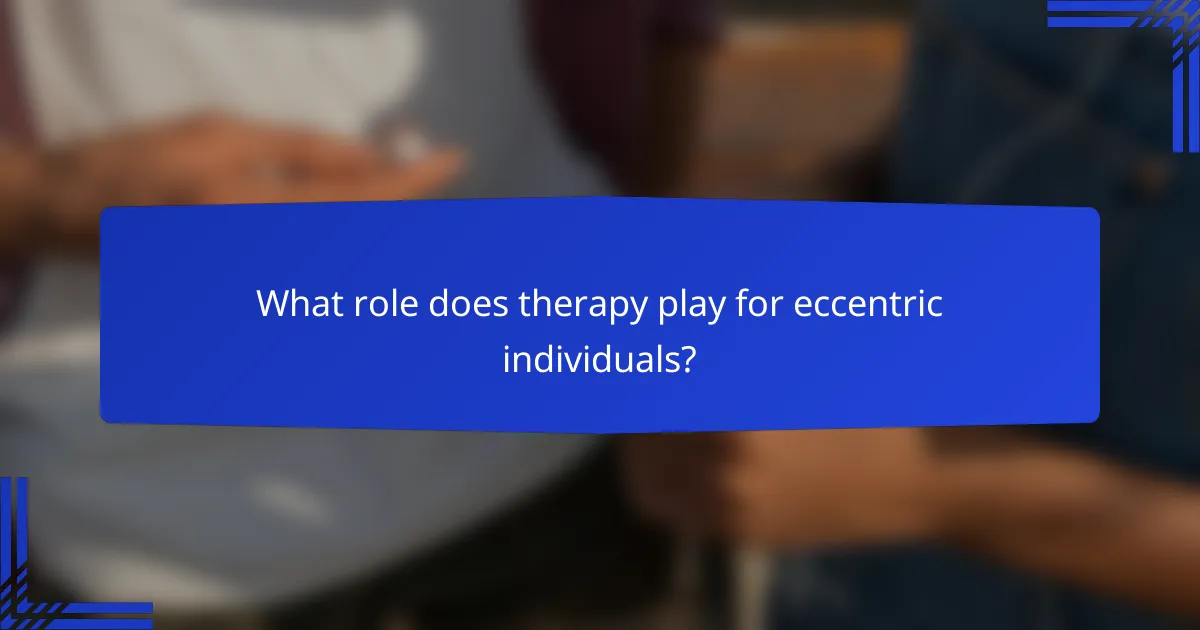
What role does therapy play for eccentric individuals?
Therapy can provide eccentric individuals with essential support in navigating social rejection and mental health challenges. It offers tailored coping strategies to help them manage their unique experiences and enhance their overall well-being.
Cognitive Behavioral Therapy
Cognitive Behavioral Therapy (CBT) is a structured approach that helps eccentric individuals identify and change negative thought patterns. By focusing on the connection between thoughts, feelings, and behaviors, CBT enables clients to develop healthier coping mechanisms and improve their social interactions.
In practice, CBT often involves setting specific goals, challenging irrational beliefs, and practicing new skills in real-life situations. For example, an individual may work on reframing negative self-talk or gradually exposing themselves to social situations that cause anxiety.
Art therapy
Art therapy utilizes creative expression as a means for eccentric individuals to explore their emotions and experiences. This therapeutic approach can be particularly beneficial for those who find it challenging to articulate their feelings verbally.
Through various artistic mediums, such as painting, drawing, or sculpture, clients can process complex emotions and gain insights into their mental health struggles. Art therapy sessions often encourage experimentation and self-discovery, allowing individuals to express themselves in a non-judgmental environment.
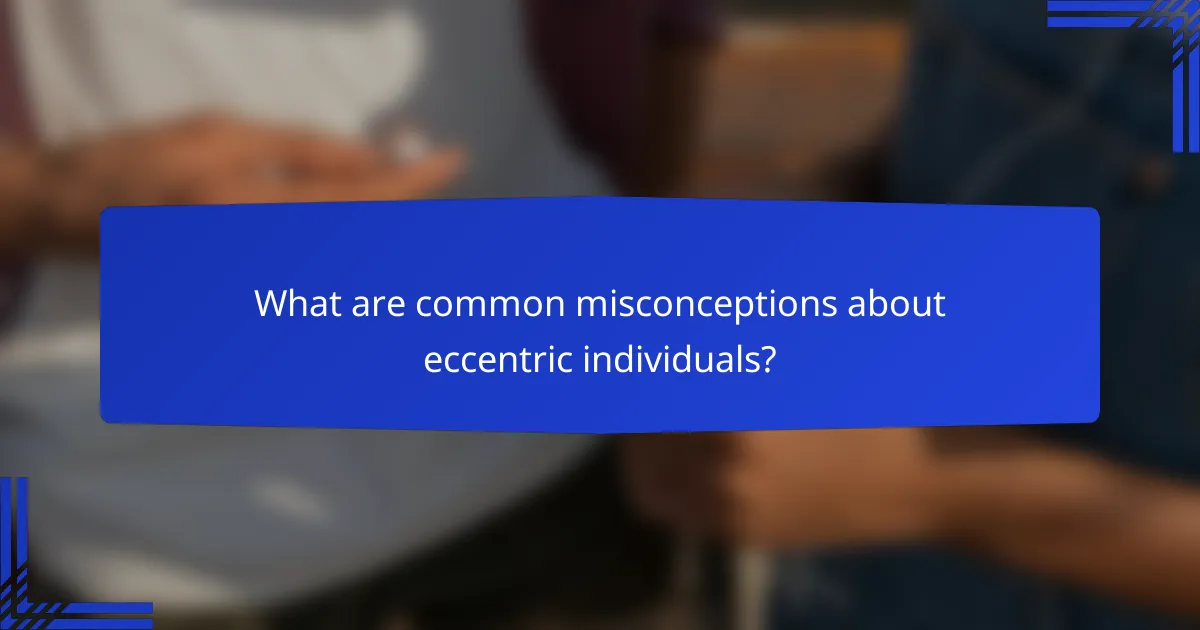
What are common misconceptions about eccentric individuals?
Many misconceptions about eccentric individuals stem from a lack of understanding of their behaviors and lifestyles. Often, these individuals are unfairly labeled as mentally ill or socially inept, overshadowing their unique perspectives and contributions.
Association with mental illness
A common misconception is that eccentric behavior is synonymous with mental illness. While some eccentric individuals may experience mental health challenges, many do not. Eccentricity can simply reflect a person’s unique personality traits or creative thinking.
It’s crucial to recognize that mental health struggles can affect anyone, regardless of their eccentricity. Support and understanding are key in addressing these issues, rather than jumping to conclusions about a person’s mental state based solely on their unconventional behavior.
Negative stereotypes
Eccentric individuals often face negative stereotypes that paint them as outcasts or socially awkward. These stereotypes can lead to social rejection and isolation, which may exacerbate any existing mental health issues. Challenging these stereotypes is essential for fostering a more inclusive society.
To combat negative perceptions, it’s helpful to focus on the positive attributes of eccentricity, such as creativity and innovation. Encouraging open-mindedness and acceptance can help break down barriers and promote understanding among diverse individuals.
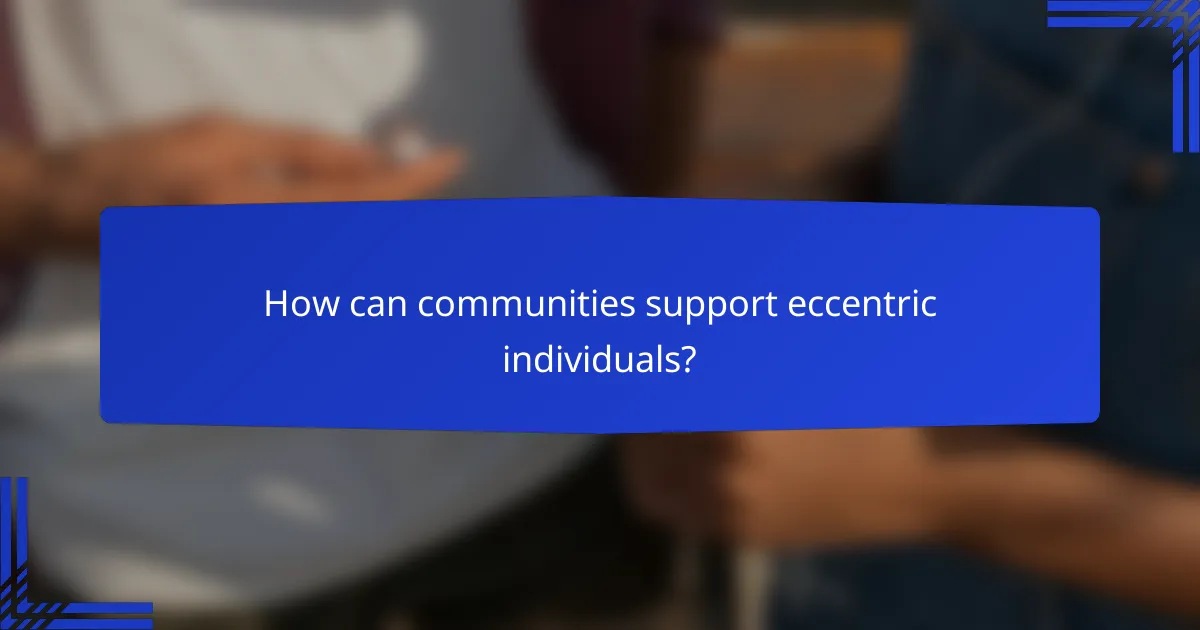
How can communities support eccentric individuals?
Communities can support eccentric individuals by fostering an inclusive environment that values diversity and encourages participation. This involves creating spaces and opportunities where unique perspectives are welcomed and celebrated.
Inclusive events
Inclusive events are gatherings designed to welcome individuals of all backgrounds, including those who may be considered eccentric. These events can range from art exhibitions to community fairs, providing platforms for self-expression and connection.
When planning inclusive events, consider accessibility, diverse programming, and opportunities for interaction. For instance, workshops that allow participants to showcase their talents or share their stories can create a sense of belonging and acceptance.
To ensure success, promote these events through various channels, such as social media, local newsletters, and community boards. Engaging local businesses for sponsorship or collaboration can also enhance visibility and resources.
